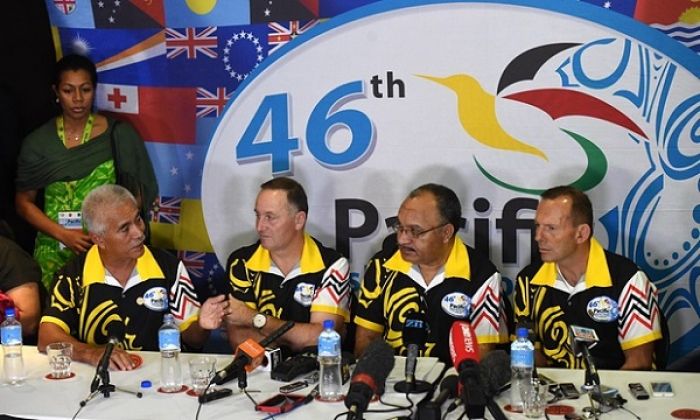Pacific Island Forum Leaders Declaration on Climate Change Action Featured
 President of Kiribati Hon. Anote Tong, New Zealand PM Hon. John Key, PNG PM Hon. Peter O'Neil and Australian PM Hon. Tony Abbot
President of Kiribati Hon. Anote Tong, New Zealand PM Hon. John Key, PNG PM Hon. Peter O'Neil and Australian PM Hon. Tony Abbot
46th Pacific Islands Forum Leaders Summit – Port Moresby 2015
We, the Leaders of the Pacific Islands Forum:
- are deeply concerned about the serious impacts of and growing threat posed by climate change to the economic, social, environmental and cultural well-being and security of Pacific Island Countries and Territories (PICTs), and our peoples.
- are alarmed at the current and projected impacts of climate change, coupled with the region’s physical vulnerability and limited capacity, are exacerbating the challenges on the sustainable development efforts and future existence of Pacific Island Countries and Territories.
- reiterate that Pacific Island Countries and Territories are amongst the most vulnerable and least able to adapt and to respond; and the adverse consequences they face as a result of climate change, including the exacerbation of climate variability, sea level rise, ocean acidification, and more frequent and extreme weather events, are significantly disproportionate to negligible collective contribution to the global greenhouse gas emissions.
- are serious about reducing greenhouse gas emissions, and are committed to show leadership through ambitious submissions of Intended Nationally Determined Contributions (INDCs) to the United Nations Framework Convention on Climate Change (UNFCCC), implement commitments under the Majuro Declaration for Climate Leadership in 2013 to reduce emissions and reliance on fossil fuels, and promote low carbon development through supporting initiatives such as the Sustainable Energy for All (SE4All), SIDS DOCK and REDD+.
- are gravely concerned that we are already facing adverse effects of climate change with the current average global temperature increase of 0.85 degree Celsius, and any further warming could push many countries beyond their capacity to adapt.
- declare that an increase of 1.5 degrees Celsius would severely exacerbate the particular challenges facing the most vulnerable smaller island states of the Pacific and urge, all effort be made to stay within the global temperature goal, as noted by the Conference of Parties to the UNFCCC in its decision of 1/CP20.
- recognise the need to accelerate and intensify efforts to adapt to the impacts of climate change, and to further develop and implement policies, strategies and legislative frameworks, with support where necessary, to climate-proof essential physical infrastructure, adapt key economic sectors and ensure climate-resilient sustainable development for present and future generations.
- acknowledge that successful interactive action is achievable and note that the phasing down of hydrofluorocarbons (HFCs) under the Montreal Protocol has been important in mobilising action and, that such action has key benefits for climate change mitigation.
- reaffirm that the Paris Conference 2015 is crucial for all in order to deliver an ambitious, legally-binding agreement under the UNFCCC applicable to all, which reflects the principle of common but differentiated responsibilities and respective capabilities, in light of different national circumstances.
- recognise the importance of amplifying the Pacific voice at all avenues possible with a view to influence the Paris outcome, and note the positions of the region as expressed in other meeting outcomes and declarations, including the Smaller Island States Leaders’ Port Moresby Declaration on Climate Change in September 2015, the Suva Declaration on Climate Change in September 2015, the Nuku’alofa Ministerial Declaration on Sustainable Weather and Climate Services for a Resilient Pacific in July 2015, the Polynesian Leaders’ Taputapuatea Declaration on Climate Change in July 2015, the Lifou Ministerial Declaration on Climate Change in April 2015, the SIDS Accelerated Modalities of Action (SAMOA) Pathway in September 2014, the Majuro Declaration on Climate Leadership in September 2013, and the Niue Declaration on Climate Change in August 2008.
- call for the timely conclusion of the negotiations under the UNFCCC to adopt a new, ambitious and legally binding international climate change agreement applicable to all Parties, in Paris at COP 21, and for the Paris outcome to include, inter alia:
- recognition of the special circumstances and vulnerability of Small Island Developing States (SIDS), particularly those in the Pacific, and Least Developed Countries;
- support for ongoing and improved weather, climate, water, and related environmental services, their analysis and modeling of impacts to inform political, economic and social policies in the Pacific;
- ambitious, clearly-defined and transparent commitments by all Parties to reduce greenhouse gas emissions through their INDCs, in line with the ultimate objective of the UNFCCC to stabilise greenhouse gas concentrations in the atmosphere at a level that prevents dangerous anthropogenic interference with the climate system;
- provisions for regular review of mitigation commitments, in light of the most recent science, as well as pathways for higher ambition, and provide an opportunity to recommit to stronger action;
- acknowledgement of the importance of transparency and accountability to the environmental integrity and effectiveness of the new agreement;
- requirements that Parties will make their strongest possible efforts to achieve and progressively enhance national and global mitigation action;
- accelerated and effective delivery of international support for the design and implementation of adaptation and mitigation actions especially for the most vulnerable countries already experiencing existential challenges from climate change, in relation to capacity building, technology transfer, knowledge and information sharing, and improved access to climate change finance;
- a commitment to scale up the provision of financial resources, noting the commitment by developed country Parties, in the context of meaningful mitigation actions and transparency on implementation, to a goal of mobilising jointly US$100 billion per year by 2020 to address the needs of developing countries, from a wide variety of sources, and a request for Parties to continue to enhance their enabling environments and policy frameworks to facilitate the mobilisation and effective deployment of climate change finance;
- simplified access to financial resources to support climate change action and resilience that accounts for the particular circumstance of SIDS, especially those in the Pacific, and Least Developed Countries. The outcome should also encourage Parties to ensure improved effectiveness of existing and new support, and provide support for readiness activities for capacity constrained countries, such as Pacific Small Island Developing States and the Least Developed Countries;
- inclusion in the Paris outcome of loss and damage as a critical and stand alone element for building resilience against climate change impacts, including responding to extreme weather and slow onset events, and builds on the ongoing work of the Warsaw International Mechanism for Loss and Damage associated with Climate Change Impacts in developing countries that are particularly vulnerable to the adverse effects of climate change;
- inclusion in the Paris outcome relevant provisions to support further actions under the Warsaw Framework for REDD+;
- recognition of the disproportionate impact of climate change on women, youth, the elderly, disabled, indigenous peoples and other vulnerable and marginalised groups, and acknowledgement of the contribution of these peoples to the effective implementation of the Paris outcome; and,
- acknowledgment of the crucial role women will play in a global solution to climate change and the importance of gender responsive outcomes that encourage full and equal participation of women in all climate change actions, decision-making processes and improved accessibility to financial resources.



